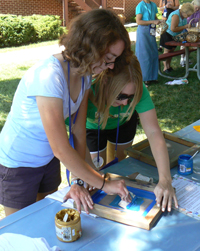As host for a multitude of participants, from infants to adults — some over 80 — Synod School 2010 here lived up to its promotion as "a learning and personal enrichment experience for people of all ages."
Sponsored by the Synod of Lakes and Prairies, Synod School drew 627 participants — a record for the event — when it ran July 25-30 at Buena Vista University. Enrollment typically runs in the high 500s.
This year's event, running under the theme, "Grace Notes," featured 67 scheduled classes, daily convocation addresses, morning and evening worship, mini-courses, coffee-house music, movies and more.
In the early afternoon, in what the school’s catalog calls "Art Share," everyone gets an "opportunity to create a special Synod School memory" through a variety of crafts, including silk screening, basket weaving and other arts and crafts. In the evening, the school's "Saints-a-Playin'" takes place after worship, offering a time for everyone "to work off some excess energy" in games on the lawn outside the chapel.
But now, the story goes back to a morning at Synod School.
At convocation …
Rodger Nishioka, associate professor of Christian education at Columbia Theological Seminary in Decatur, Ga., delivered morning convocation addresses, focusing on the theme of Synod School, the history of reformed theology and his own five tenets of reformed theology.
Nishioka's morning addresses, part lecture, part humor and part personal experiences, delighted the audience and his evening discussions — part of the mini-course offerings — drew standing-room only crowds.
When he spoke about "nearness" and "directness" as elements of youths' faith decision, he used his own father as an example. His father, a minister, prayed before eating in restaurants and Nishioka, then a teen-ager, said, "I just felt humiliated by my parents."
Now, when he gets his small bag of peanuts on a commercial flight, he said, "What do I do? I pray."
That story showed the impact of "nearness," the effect being near someone of faith. Another story demonstrated "directness."
Nishioka told of a teen who attended church every Sunday, but left immediately after worship. An elderly woman in the small congregation began to corner the teen every Sunday, keeping him from leaving. She would hug him and tell him she prayed daily for him. The teen would say "all right" and then leave.
Months later, when the woman was hospitalized, Nishioka continued, the teen visited her, hugged her, and told her everything would be all right. Doubting, the woman asked, "How do you know?" The teen said, "Because I've been praying for you every day."
When the woman finally returned to church, using a walker to move down the aisle, the teen escorted her.
In the office …
Just like a typical school, there's an office.
During daytime hours, the office is home of Diana Barber, synod associate executive for leadership development and staff for Synod School, and other members of the leadership team.

Connor and Lori Amlee add another strip to a basket during Synod School’s afternoon “Art Share” time.
Barber provides technical and administrative support during the event and keeps everything on track year-to-year, maintaining the drive that keeps this Synod School on its successful track — it's the only Synod School remaining within the denomination.
In a 30-minute period last week, sitting at the desk just inside the office door, Barber answered lost-and-found and worship questions, made change and directed one instructor to the photocopier.
This year, the Rev. Bob EnTin, a retired pastor in the Presbytery of North Central Iowa, served as dean of Synod School this year, and the Rev. Tammy Rider, stated supply pastor for First Presbyterian Church, Rushford, Minn., served as associate dean.
Rider will be dean next year, and planning for Synod School 2011 begins only a few weeks after the evaluations are reviewed and the books close on this year’s event.
Duane Sweep, a frequent contributor to Presbyterian News Service, is associate for communications for the Synod of Lakes and Prairies.

